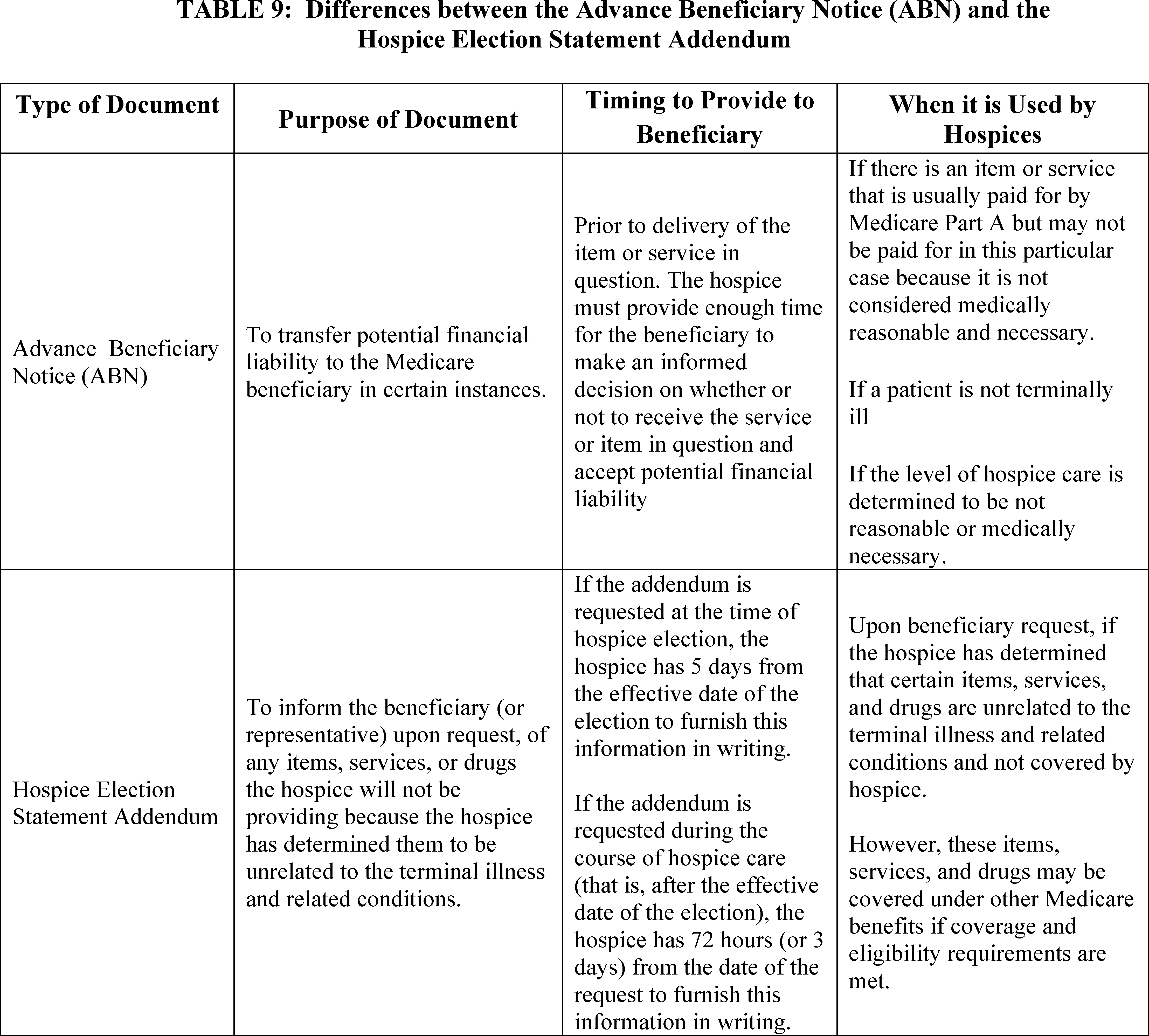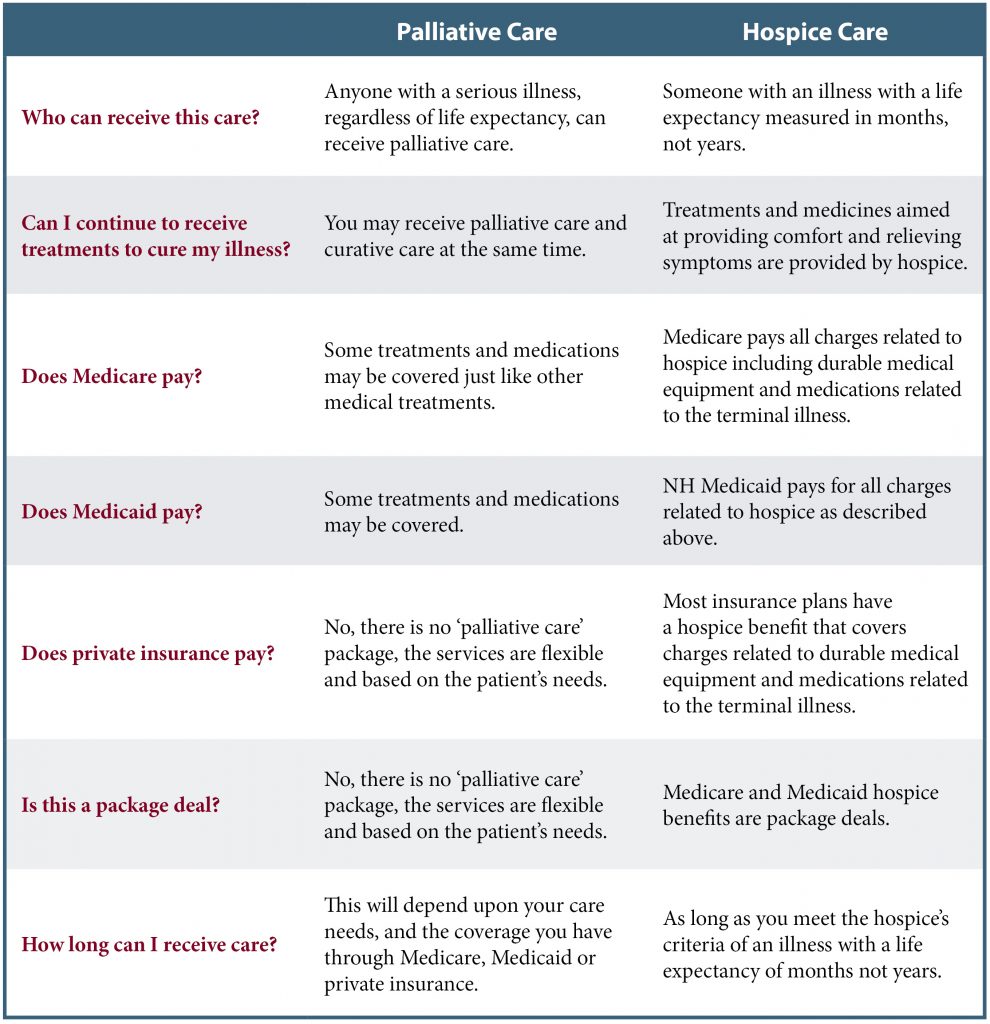Palliative Care Frequently Asked Questions:
You probably have plenty of questions about palliative care. For instance – what is palliative care and who pays for it? When is palliative care appropriate? The goal of our palliative care program is not just to support the patient but also to answer any questions you may have.
Read our palliative care questions below to learn more.
Medicare Part B And Palliative Care
Medicare Part B covers outpatient care options that are medically necessary. This includes things like doctor visits, wellness checks, outpatient therapeutic services like physical therapy, most mental health care options, some instances of home care, and durable medical equipment.
If you arent an inpatient at a hospital, then it is more likely that your palliative care option will be covered under Part B, if covered at all. Most forms of palliative care, like mental health care and therapeutic treatment, will take place in an outpatient setting.
Overall, the rules for palliative care coverage under Medicare Part B are similar to those for Part A. If the care is medically necessary, then it will be covered. This designation depends on your specific condition, your treatment options, and your doctors judgment of the situation as a whole.
Palliative care team options are also available for outpatient services. Your doctor may put you in contact with palliative care specialists that can help coordinate different aspects of your treatment, including diet, prescription drug use, and therapeutic treatment.
What Health Services Does Medicare Provide With Hospice Coverage
Hospice care provided through Medicare is usually given in your home or a long-term care facility you live in such as a nursing home. Generally, hospice coverage should cover most of your health care needs, but if not Medicare Parts A and B will still pay for covered benefits and services for health problems unrelated to your terminal illness and accompanying conditions.
Medicare.gov provides the following list of covered items for hospice:
- All items and services needed for pain relief and symptom management
- Medical, nursing, and social services
- Drugs for pain management
- Durable medical equipment for pain relief and symptom management
- Aide and homemaker services
- Other covered services you need to manage your pain and other symptoms, as well as spiritual and grief counseling for you and your family
Other health care services may also be covered under your hospice plan, but it depends on the specific terminal illness and related conditions you have. These additional covered services could include things such as physical therapy services, dietary counseling, and spiritual and grief counseling for you and your family. See a more complete list from Medicare.gov here.
Don’t Miss: What Type Of Insurance Is Medicare Part D
Are Hospice And Palliative Care The Same Thing How Is Palliative Treatment Different
This is perhaps the most common palliative care question. The answer is no. Unlike hospice, palliative care is available to you at any stage of a serious illness. You can receive palliative care at the same time you receive treatment meant to cure your illness. Patients on hospice care receive palliative care . However, hospice care focuses on a persons last months of life.
Another key difference is that hospice offers significantly more services than palliative care, and at no additional cost to the patients or their families. For more information, visit our page on hospice vs. palliative care.
How Can I Pay For Care

As a recognized medical specialty, supportive palliative care interdisciplinary team services are covered by Medicare, Medicaid and many commercial insurance plans. Hospice is a Medicare and Medicaid benefit it also is covered by many commercial insurance plans as well. Services also might be available for veterans from the Department of Veterans Affairs.
Also Check: Does Medicare Cover Fall Alert Systems
Also Check: Can You Be Denied Medicare Coverage
Which Services Are Not Covered By Medicares Hospice Benefit
Medicare will not cover these items and services once your hospice benefit starts:5
- Treatment intended to cure your terminal illness and/or related conditions
- Prescription drugs that arent for your terminal illness or related conditions
- Care from any provider that wasnt set up by the hospice medical team
- Room and board*
- Care you get as a hospital outpatient , care you get as a hospital inpatient or ambulance transportation
*If your hospice team decides you need short-term inpatient or respite care services that they arrange, Medicare will cover your stay in the facility. You may have to pay a small copayment for the respite stay.6
Medicare may cover these services if your hospice team arranges it or its unrelated to your terminal illness and related conditions.7
What Is Palliative Care
Palliative care helps improve the physical, mental, social, and spiritual quality of life for those with serious or life threatening illnesses.
When diagnosed with a serious illness, you may choose to receive palliative care in addition to any other ongoing treatments. In this case, palliative care aims to maintain your quality of life throughout your illness.
If youve been diagnosed with a terminal illness with less than 6 months to live, you may seek hospice care. In this situation, care centers around providing a good quality of life until the end of life.
People of all ages with serious illnesses can choose palliative care to retain as much of their quality of life as possible. Some of the serious illnesses that may benefit from palliative care include:
If you opt to receive palliative care for your illness, the services you receive are based your specific needs. Palliative care services may include:
- pain relief for physical symptoms
- emotional support for mental and spiritual needs
- understanding the treatment options for the illness
- help in making decisions for your treatment and care
- overall support for the illness whether treatment is being sought or not
You May Like: How To Request A Replacement Medicare Card
What Does The Palliative Care Team Look Like For People With Dementia
A care team supports the patient with dementia, their family and caregivers. Palliative care specialists may help the patient and their families by: ensuring understanding of the illness as it progresses, managing individual goals, needs and symptoms, addressing safety of the patient and coordinating medical needs with the palliative care team and other doctors.5
The palliative care team for someone with dementia may include: a team of doctors, nurse and nurse practitioners, social workers, chaplains, family members and caregivers. Each palliative care team is individualized to the patient and each patient may receive different types of care depending on personal needs and goals.
Elements of palliative care team may include:
You May Like: Does Medicare Cover Hiv Medication
Do Medicare Advantage Plans Cover Palliative Care
Medicare Advantage plans are required by law to provide all of the same benefits as Original Medicare with one exception: hospice care .
However, if you have a Medicare Advantage plan, your hospice and palliative care will still be covered under Original Medicare. Remember, when you sign up for a Medicare Advantage plan, you are still technically enrolled in Original Medicare as well.
Some Medicare Advantage plans may also cover home health care items and services, such as bathroom grab bars and home meal delivery, both of which are not covered by Medicare Part A and Part B.
Don’t Miss: What Medicare Supplement Covers Hearing Aids
What Does Palliative Care Treatment Entail
Palliative care entails prescribing medications and recommending therapies and resources to help patients get everything they need to deal with a chronic or life-limiting illness. The palliative care team typically consists of a palliative care physician, nurse practitioner and medical social worker.
How Do You Qualify For Medicare To Cover Hospice Care
Hospice care can be covered by Medicare if all the below conditions are met for you or your loved one.
*NOTE: You may be able to continue to get hospice care covered by Medicare if the hospice medical director or hospice doctor recertifies you are still terminally ill.
Also Check: How Much Does Humira Cost With Medicare
Does Private Health Insurance Cover Palliative Care
Yes. One of the most common ways to cover palliative care costs is by relying on private insurance. Generally, this medical care is covered either fully or partially by most private health insurance plans.
The coverage is similar to that of other medical or hospital services, but you might have a copay for this care the same way you do for other covered services.
However, more and more health insurance providers also cover community- and home-based palliative care as a supplementary benefit in fact, the number of health plans offering that is up by roughly 110 percent from 2019.
Each insurance policy is unique and may define palliative care differently. Depending on your policy, it may be considered part of chronic or long-term care or even included under hospice care.
Its important to read over your insurance terms to learn if your plan places limits on palliative care, as it may limit what kind of illnesses qualify for care and where you can receive this type of care, especially if youre getting it in the hospital, in rehab, or in a skilled nursing facility instead of within your home.
There may also be additional costs that you must pay out of pocket, like premiums, deductibles, copayment, and coinsurance. For that reason, always check with your insurance company to learn more about what is covered in your policy.
Read Also: Can I Get Glasses With Medicare
Choosing A Doctor: Does Insurance Cover Palliative Care

Most private health insurance plans and health maintenance organizations cover palliative care services, although some treatments and medicines may not be covered under individual plans.
Medicare Part B and Medicaid also pay for some palliative care, depending on the treatment. Medicare generally doesnt separate palliative care from the rest of your covered services, so your palliative care provider will be paid like any doctor.
Here are four questions you should ask a potential provider if youre considering palliative care.
Will my loved ones be involved? One of the main tenets of palliative care is to help inform and support caregivers as well as patients. You want to check that your care team is trained and willing to offer such support.
Also Check: How Many Days Does Medicare Cover Skilled Nursing Facility
Medicare Part C : Palliative Care
Medicare Part C is also known as an MA plan or a Medical Advantage plan. It is a supplemental health plan in addition to Part A and Part B provided through private insurance companies which are approved by Medicare.
These plans can offer more coverage and benefits. Sometimes, these optional benefit packages are not available through Medicare. Examples of extra benefits include: vision, dental and hearing, car rides to medical appointments, home-delivered meals, non-opioid pain management and health wellness programs which may be necessary for palliative care treatment. What an individual will pay depends on the plan chosen as well as the subsequent plans rules like seeing in-network providers.
Examples of palliative care include the original Medicare coverage of Part A and Part B. Examples of extra benefits which may assist in palliative care include: vision, dental and hearing, car rides to medical appointments, home-delivered meals, non-opioid pain management and health wellness programs.
Other Rules For Medicare Palliative Coverage: Medigap Vs Medicare Advantage
Medigap and Medicare Advantage are supplemental plans to the original Medicare plans . However, they are quite different and beneficiaries can only choose one or the other. Medigap, or Medicare Supplement Insurance, consists of 10 types of plans that private insurance companies sell.
Each plan has a unique blend of things covered and work to fill in the gaps of original medicare plans costs, such as out-of-pocket costs. Medicare Advantage, also a private plan sold through insurance companies, covers what Medicare Part A and B do along with supplemental coverage.
Some plans include coverage for prescription drugs and are called Medicare Advantage Prescription Drug plans . These plans can vary depending on location. The main difference between the two is that Medigap is used in conjunction with original Medicare and Medicare Advantage is a replacement plan. Other differences include usage of plans, variety of plan availability and coverage differences .47
Read Also: Who Is Entitled To Medicare Benefits
What Hospice Care Is Covered
Hospice care providers care for the whole person, meaning they help address physical, emotional, social and spiritual needs .
The following things related to hospice care are covered, according to Medicare:
-
All items and services needed for pain relief and symptom management.
-
Medical, nursing and social services.
-
Drugs to manage pain.
-
Durable medical equipment for pain relief and managing symptoms.
-
Aide and homemaker services.
-
Other covered services needed to manage pain and additional symptoms, and spiritual and grief counseling for you and family members.
In addition to you and your family members, your hospice care team may include some or all of the following:
|
Doctors |
|
|
Pharmacists |
Volunteers |
Youll also have the option of a hospice nurse and doctor who are on-call 24/7, for the sole purpose of giving your family support.
What Are The Medicare Requirements For Inpatient Hospice Coverage
Medicare requirements for inpatient hospice coverage include:
- Your doctor or specialist certifies that you have a life expectancy of six months or less.
- You choose comfort care instead of curative treatments.
- You are experiencing severe pain and symptoms that would best be treated in an inpatient center rather than at home or in a nursing home or assisted living facility.
Also Check: What Eye Care Does Medicare Cover
Am I Eligible For Coverage
You become eligible for Medicare-covered hospice care when you meet all of the following requirements:
- Your regular doctor and hospice doctor certify that you are terminally ill and have 6 months or less to live.
- You choose palliative care for comfort instead of treatments to cure your illness or prolong your life.
- You sign a form stating your choice for hospice care instead of treatment-related care.
When you receive hospice care, your comfort is the most important priority. Many different hospice services are available, based on your end-of-life needs. These may include:
- doctor and nursing services
- physical, occupational, and speech therapy
- grief counseling for you and your family members
- short-term inpatient or respite care
While Medicare generally covers almost everything related to hospice care at no cost, it doesnt cover living expenses while at home or at another living facility.
Who Can Provide Palliative Care
Palliative care can address suffering experienced in all areas of your life. Because of this, a diverse team can be involved in providing palliative care. The team may include:
- bereavement support workers
- informal caregivers, such as family members
The type of care team and level of training they receive can vary across the country.
Don’t Miss: How Do I Stop Medicare Calls
Medicare Part B: Palliative Care
Medicare Part B is medical insurance. It covers medically necessary services and supplies as well as preventative care. Medicare coverage may mean paying nothing if providers are in network with Medicare, keeping in mind deductible and coinsurance.
According to Healthcare.com1, Medicare Part B premium for 2022 is $170.10 per month. If there are social security benefits in place, premiums are taken out of that. There are also considerations for income reporting and adjustments.4
Palliative care typically covered under Medicare Part B may include: doctor visits, lab tests , second opinions, specialists, same-day surgeries and medical supplies, preventative care , some prescriptions, mental health services, medical equipment, ambulance services and clinical studies that are medically relevant.
Speak to a doctor or health care provider about Medicare coverage and if Medicare covers a specific item, service or supply. Just like with Part A, Part B coverage is based on: federal and state laws, Medicares decisions on whether something is covered on a national level, and local companies decisions that process claims based on whether something is medically necessary or covered.2
Related:Does Medicare Cover Home Health Care
Paying For Palliative Care

Palliative care consultations are covered by Medicare, VA benefits and most private insurance plans. Co-pays may apply. A consultation does not guarantee ongoing care, but it is your first step to getting support.
If you have Medicare Part A coverage, you may be able to receive palliative care, much like getting care from other medical specialists. To get palliative care at home, request a referral for home-based palliative care which is covered by Medicare under some circumstances.
If you have Medicare Part B coverage, it may cover some of the services and supplies to treat your disease. If you are covered by Medicaid, it may cover some palliative care treatments and medications.
Many private insurance plans also cover palliative care as part of their chronic care, long-term care or hospice benefits.
To ensure you’re not surprised with unintended bills, talk to representatives at the office of the palliative care provider. Next, call Medicare, Medicaid or your insurance provider to confirm coverage for specific services. Ask about co-pays for those services.
Recommended Reading: When Is The Next Medicare Open Enrollment
